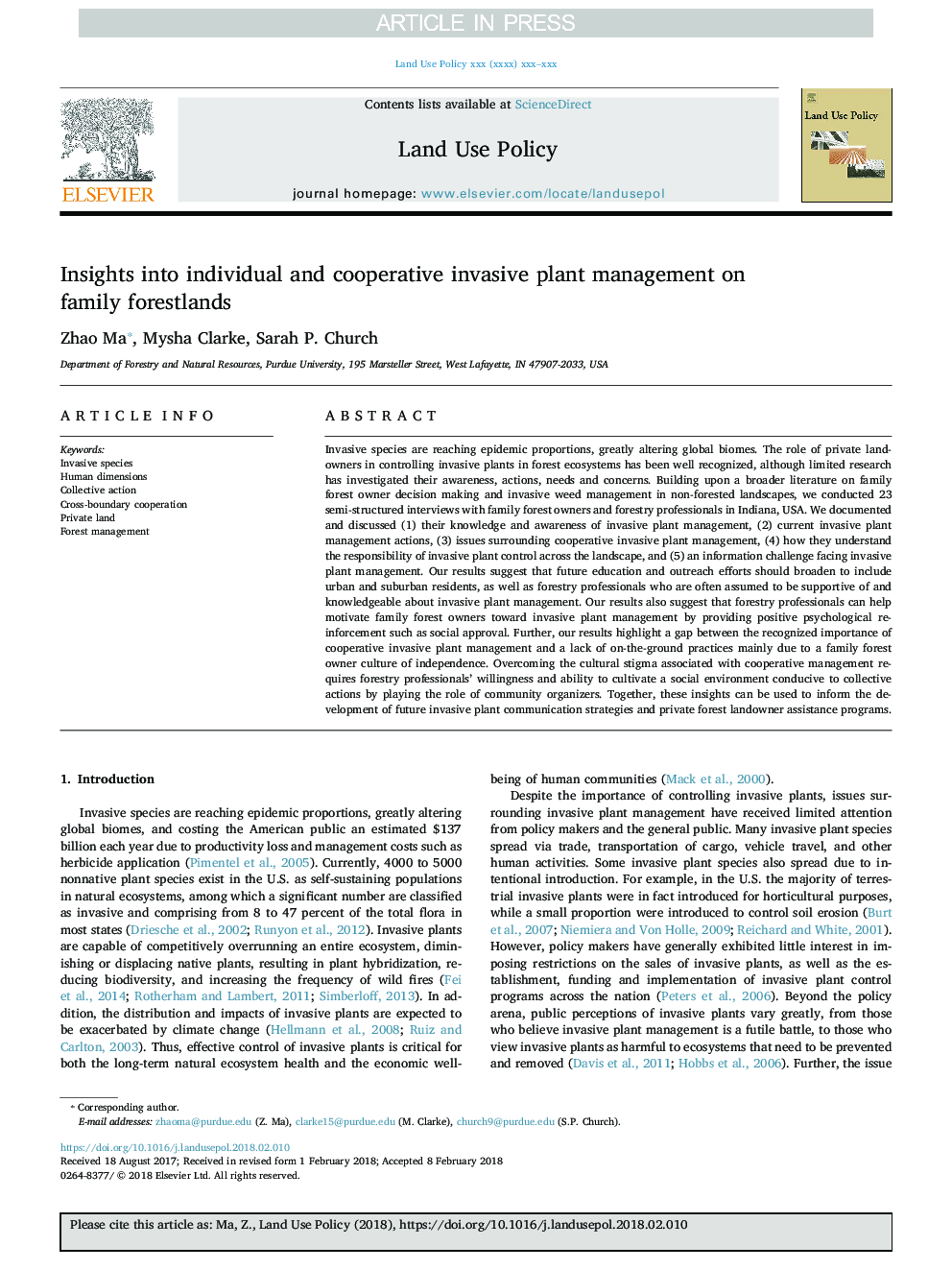| کد مقاله | کد نشریه | سال انتشار | مقاله انگلیسی | نسخه تمام متن |
|---|---|---|---|---|
| 6546480 | 1421808 | 2018 | 12 صفحه PDF | دانلود رایگان |
عنوان انگلیسی مقاله ISI
Insights into individual and cooperative invasive plant management on family forestlands
ترجمه فارسی عنوان
بینش در مدیریت گیاه تهاجمی فردی و تعاونی در جنگل های خانوادگی
دانلود مقاله + سفارش ترجمه
دانلود مقاله ISI انگلیسی
رایگان برای ایرانیان
کلمات کلیدی
گونه های مهاجم، ابعاد انسانی، اقدام جمعی، همکاری مرزی زمین خصوصی، مدیریت جنگل،
ترجمه چکیده
گونه های مهاجم به مقابله با اپیدمی می رسند و تغییرات بیوم های جهانی را تغییر می دهند. نقش زمینداران خصوصی در کنترل گیاهان تهاجمی در اکوسیستم های جنگل به خوبی شناخته شده است، اگر چه تحقیقات محدود آگاهی، اقدامات، نیازها و نگرانی های آنها را مورد بررسی قرار داده است. با تکیه بر ادبیات گسترده تر در مورد تصمیم گیری صاحب جنگل خانواده و مدیریت تهاجم علف های هرز در مناظر غیر جنگل، ما 23 مصاحبه نیمه ساخت یافته با صاحبان جنگل های خانوادگی و متخصصان جنگلداری در ایندیانا، ایالات متحده آمریکا انجام دادیم. ما (1) دانش و آگاهی خود را از مدیریت گیاهان تهاجمی، (2) اقدامات مداخلات فعلی تهاجمی گیاه، (3) مسائل مربوط به مدیریت گیاه تهاجمی تعاونی، (4) چگونگی درک مسئولیت کنترل گیاه تهاجمی در سراسر چشم انداز و (5) یک چالش اطلاعاتی که با مدیریت گیاه تهاجمی مواجه است. نتایج ما نشان می دهد که تلاش های آموزش و پرورش در آینده باید شامل ساکنان شهری و حومه، و همچنین متخصصان جنگلداری شود که اغلب در نظر گرفته شده است که در مورد مدیریت گیاهان مهاجم پشتیبانی و آگاه باشند. نتایج ما نیز نشان می دهد که متخصصان جنگلداری می توانند به تقویت صاحبان جنگل های خانوادگی به سوی مدیریت گیاهان مهاجم، با ارائه تقویت روحی مثبت از جمله تأیید اجتماعی، کمک کنند. علاوه بر این، نتایج ما یک شکاف بین اهمیت شناخته شده مدیریت کارخانه تهاجمی تعاونی و فقدان شیوه های زمین را عمدتا به سبب استقلال جنگل صاحب جنگل خانوادگی نشان می دهد. غلبه بر ننگ فرهنگی مرتبط با مدیریت تعاونی، مستلزم تمایل و توانایی متخصصان جنگل برای پرورش یک محیط اجتماعی است که باعث ایجاد انگیزه برای اقدامات جمعی می شود، با نقش نقش سازندگان جامعه. با هم، این بینش می تواند مورد استفاده قرار گیرد برای اطلاع رسانی در مورد آینده استراتژی ارتباطات گیاه تهاجمی و برنامه های کمک مالک زمین جنگل خصوصی.
موضوعات مرتبط
علوم زیستی و بیوفناوری
علوم کشاورزی و بیولوژیک
جنگلداری
چکیده انگلیسی
Invasive species are reaching epidemic proportions, greatly altering global biomes. The role of private landowners in controlling invasive plants in forest ecosystems has been well recognized, although limited research has investigated their awareness, actions, needs and concerns. Building upon a broader literature on family forest owner decision making and invasive weed management in non-forested landscapes, we conducted 23 semi-structured interviews with family forest owners and forestry professionals in Indiana, USA. We documented and discussed (1) their knowledge and awareness of invasive plant management, (2) current invasive plant management actions, (3) issues surrounding cooperative invasive plant management, (4) how they understand the responsibility of invasive plant control across the landscape, and (5) an information challenge facing invasive plant management. Our results suggest that future education and outreach efforts should broaden to include urban and suburban residents, as well as forestry professionals who are often assumed to be supportive of and knowledgeable about invasive plant management. Our results also suggest that forestry professionals can help motivate family forest owners toward invasive plant management by providing positive psychological reinforcement such as social approval. Further, our results highlight a gap between the recognized importance of cooperative invasive plant management and a lack of on-the-ground practices mainly due to a family forest owner culture of independence. Overcoming the cultural stigma associated with cooperative management requires forestry professionals' willingness and ability to cultivate a social environment conducive to collective actions by playing the role of community organizers. Together, these insights can be used to inform the development of future invasive plant communication strategies and private forest landowner assistance programs.
ناشر
Database: Elsevier - ScienceDirect (ساینس دایرکت)
Journal: Land Use Policy - Volume 75, June 2018, Pages 682-693
Journal: Land Use Policy - Volume 75, June 2018, Pages 682-693
نویسندگان
Zhao Ma, Mysha Clarke, Sarah P. Church,
